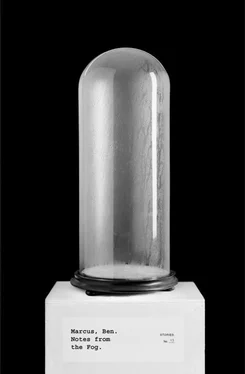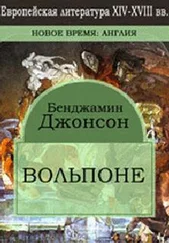I am eager to place blame, and to place it here, since it fits the differential that the intellectual elite killed the king. I believe, along with Emily Dickinson, that smart people have little to do, in the end, but make love to their children and assault those in power. But although the mathematicians were aggressive and mean and aloof, although they were sexual to a nearly unbearable degree, and they undressed me and killed me with their eyes each time I soiled the room with my presence, they were not kidnappers or killers.
—
As a grown man,my body has shrunk down and corrected to the society I keep, as if some corset in the air has kept me from becoming a disgusting giant. Since my father’s big poof, I am mostly couch-bound, heaped in blankets, awash in my own greenhouse effect. There will be no photos of me, but you might picture a boiled-faced man, long ago threshed by children with sticks. My age, when sounded out slowly, is also a word in Spanish, meaning “the fat behind the knee.” My height is not important, because I do not stand up much, unless the detective is visiting and he entreats me to survey the yard and the field beyond to search for clues. Then I slide on my garden boots, and off we go.
What I took him to see first was the burned outline of a person in the grass, way out on the back property. Like the chalk outline of a dead body, but made with fire. Had the person been on fire before he fell, thus burning the grass in his very own shape? That was the likely explanation. The detective photographed the singed grass before new grass and weeds grew in, and thank goodness, because now there might be burned ends of certain grasses here and there on our back property, but nothing coherent enough to suggest that a man, very possibly on fire, fell here and probably died here, although where he went after that no one seems to know.
Invariably we return to the garage, where wooden slats, smeared with a grease, lean in the corner. We’ll call this grease an inedible substance that might help machines operate more quietly. This grease has simply been rubbed just about everywhere, creating such a lovely shine on the older things of our home, a glistening creaminess on the wheelbarrow, the garbage tins, the withered football, the tenoning jig. There is an excess of it coating the baby flamethrower, propped in the corner. I tell the detective that the flamethrower belonged to my father, who used it to scorch our bamboo field each autumn. Always preferable to hacking at the stumps with a scythe. I do not tell him that a gasket can be removed to extend the flume, when giving chase, for instance.
And the wooden slats? They are new. No one can account for so many oddly shaped wooden slats now filling the garage. And they can be pieced together, after much puzzlement, to form a most terrible structure.
But, on the other hand, what items of our world cannot?
—
Upon our first visitto the garage, I told the detective about the wooden slats, but I did not demonstrate what could be built with them. Why build monsters for strangers? He puzzled over the grease that soon covered his hand.
“You say this is a new substance?” he asked. The utterance of the question seemed to exhaust him.
“I do not remember it before,” I replied. “You can taste it if you want to. I could have Paul bring us a spoon.” I looked around for a sign of Paul, willing my face into a searching gesture, even while inexplicably picturing Paul demonstrating intercourse to an audience of scientists in a field.
The detective sniffed his hand and held it to the sun. His face winched and he gagged, and then he laughed a little bit and seemed also, perhaps, to be crying.
He wanted to preserve some of the grease for a laboratory test, so I held open the wide-mouthed Ziploc bag he produced. I had to massage his long thin hand through the bag in order to extract the grease. I milked each finger, I felt his bones through plastic and flesh, I squeezed them down until the grease pinched off into a pasty smear at the bottom of the bag. I want to say that it felt strange—like a piece of pork—but it didn’t feel strange enough; it felt exactly and terribly just like a man’s hand should feel: there just aren’t any words.
As we hiked back up the rottenstone path, I considered the common use of grease. A body is greased so that it might better slide into a crawl space. And grease on a body can delay, for at least a short while, the effects of a high-intensity flame. These uses I kept to myself, since the detective had given in to his sadness. I walked just ahead of him so he could do his weeping in some bit of privacy, although he turned out to be the sort of man whose weeping was devoid of pathos or gravity or even any clear emotion. It sounded merely as if he was catching his breath after jogging, and I wished we had a toolshed for precisely those moments when a stranger spoils the afternoon with his expressions of feeling.
—
When the detectivefirst started his inquiry, I had hoped we would join together in our wonder, our bafflement, our aching curiosity, to probe the mystery of these lost two men, collaborating so intensely that we would be reluctant to resolve the case. Why? Because certainly that would mean a farewell so devastating we might claw our own faces off. This would be the project of a lifetime, even as wives and friends came and went, as houses eroded around us and we migrated to a trailer on the back property, where one of us peed from the steps while the other continued taking notes. During long days of research, the detective and I might discover, deep in the lodger’s web browser history, for instance, a series of site visits that would link him to my father, providing a motive so compelling that his murder of my father would seem entirely forgivable and inevitable. Our book would be called A Very Understandable Murder, and while editing the proofs we’d have several scratch fights and someone’s glasses would be smashed, but we’d emerge even closer than before, particularly after I produced a wrenchingly personal chapter admitting that, though I cared for my father, I would have killed him myself had I been the lodger. And the detective and I, now old companions who occasionally bathed and groomed each other in the evening, might choose to delay the resolution of our work, each of us keenly saddened by the prospect of such resounding success, because where, in the end, would crushing accomplishment leave us, but tired and alone and full of anxiety for the future?
—
I do not liketo speak of others. It is tiring to shine my light on people, who might shrivel under its glare and suddenly become reduced to meat and bone, a few stray teeth and a pile of hair. But remarks made in reference to the lodger are in some sense going to be remarks made about my vanished father, and are therefore permissible and useful.
We shared a certain prejudice for exercise that permits me to discuss his terribly fascinating body, which, even under the glare of my flashlight while he slept, revealed little to me. For instance, I jogged daily with the lodger down Multer to the Beeves cul-de-sac and then up Forstinge and across the Bus Road and back to the house.
At the outset of our jogs the lodger declined to limber himself. He stood at the driveway and studied the section of the newspaper devoted to numbers while I conducted my preparations. I believe in bending deeply on an inhale until my inner light goes brown, as though the buttocks of a giant are swallowing me. When I fold my body at the waist, the world around me darkens like an oily painting and I begin to see myself as people in the distant future might see me: crushed, glistening, scarcely human.
Читать дальше











